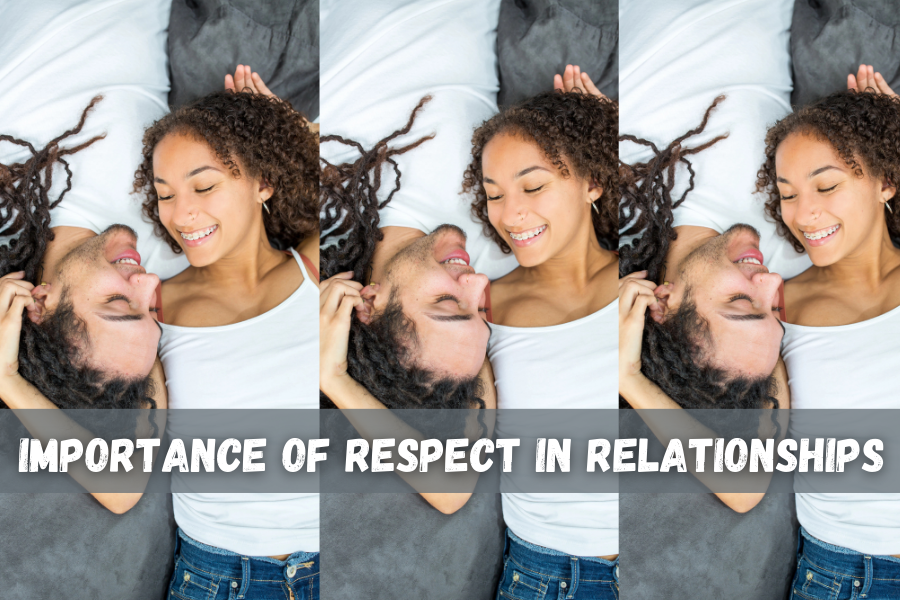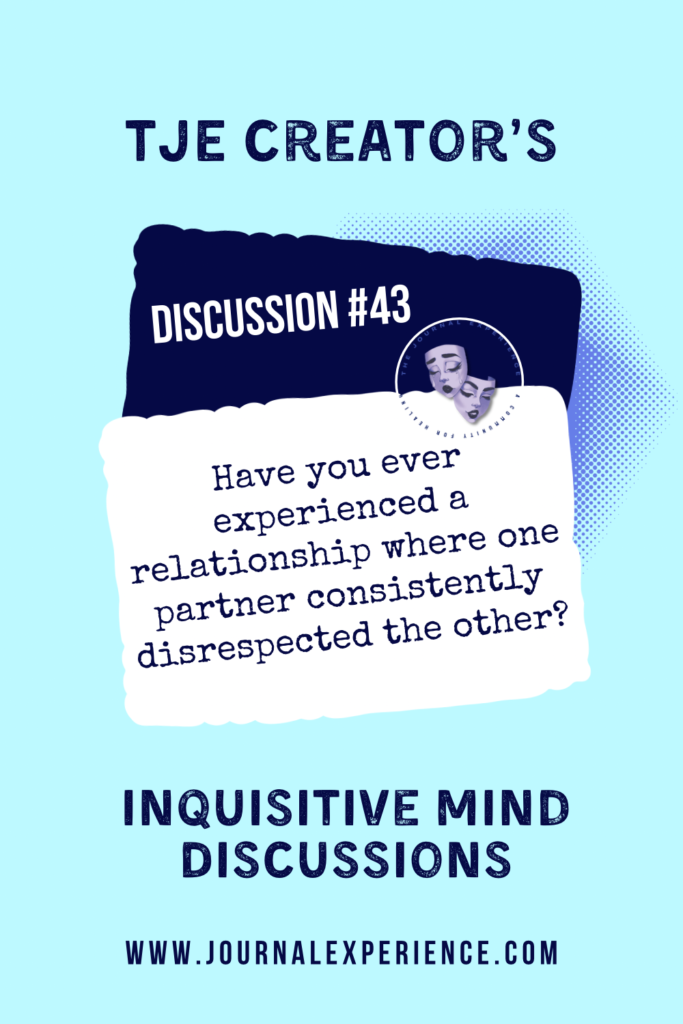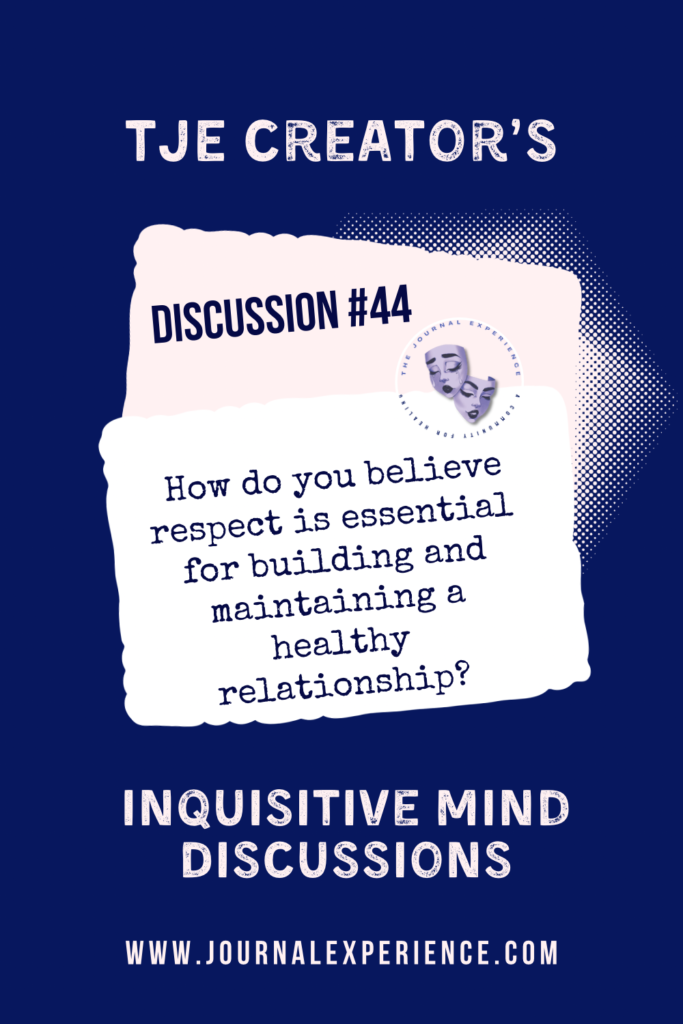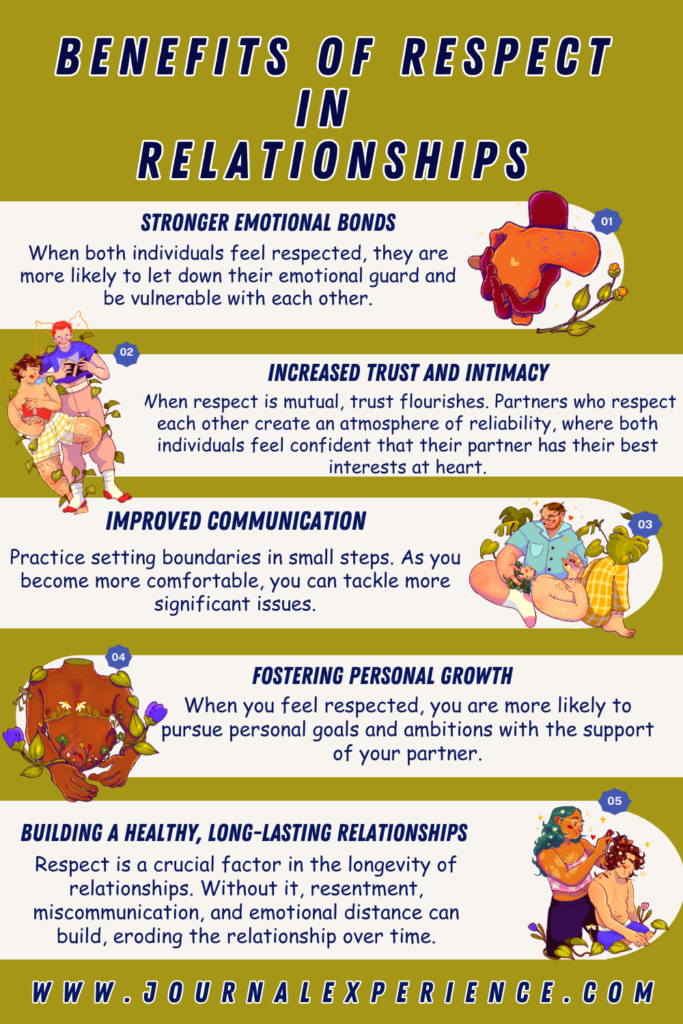Respect is the cornerstone of any healthy relationship. It’s not just about politeness, like saying “please” and “thank you.”

True respect is deeper—it’s about valuing another person, their opinions, and their feelings. It’s about treating them with kindness, consideration, and dignity.
When respect exists in a relationship, it creates a strong foundation for trust, intimacy, and open communication. These are essential ingredients for any thriving, meaningful connection.
However, the absence of respect can lead to devastating consequences.When disrespect creeps in, it erodes trust, damages emotional connections, and can even foster an environment where abuse takes root. Disrespect turns relationships toxic, leaving individuals feeling undervalued, unheard, and unsupported.
In this post, we will explore:
- The components of respect and how they shape healthy relationships
- The benefits of cultivating respect in your relationships
- Active steps to foster and maintain respect
- Common disrespectful behaviors to be wary of, and how to address them
By the end of this post, you’ll have practical strategies for building more respectful, fulfilling relationships, whether you’re recovering from toxic dynamics or looking to prevent them.
Components of Respect in Relationships
Respect is a multifaceted concept, and when broken down, we can better understand how to apply it in our daily interactions. Here are the essential components:
1. Valuing Another Person’s Opinions and Feelings
This is more than just listening—it’s truly taking another person’s perspective seriously. It means acknowledging their right to have different beliefs, emotions, and thoughts without dismissing or belittling them.
2. Treating Others with Kindness and Consideration
Everyone makes mistakes, but it’s how we respond to those missteps that matters. Respect means reacting with kindness, even in disagreement.
This entails being considerate of another person’s needs and emotions, using language that uplifts rather than tears down, and avoiding hurtful words or actions.
Even when conflicts arise, treating each other with kindness keeps the dialogue respectful.
3. Communicating Openly and Honestly
Respectful communication is about transparency and integrity. It means expressing your thoughts and feelings clearly, but also listening attentively when the other person is speaking.
Open and honest communication fosters trust, which is a critical component of any healthy relationship.

Want to rebuild respectful communication and deepen mutual understanding?
The Thrive in Love Online Course offers practical tools to strengthen respectful dialogue, heal emotional wounds, and build a safer, more connected relationship environment.
Benefits of Respect in Relationships
When respect is present, relationships can truly thrive. Respect forms the bedrock of healthy connections, nurturing trust, openness, and emotional security.
Below, we explore the numerous benefits that respect brings to any relationship, illustrating why it is essential for fostering meaningful and lasting bonds.
1. Stronger Emotional Bonds
Respect plays a critical role in creating deeper emotional connections between partners. When both individuals feel respected, they are more likely to let down their emotional guard and be vulnerable with each other.
This vulnerability fosters a sense of intimacy that strengthens the relationship over time.
- Increased Emotional Security: Feeling respected by your partner creates a safe space where you can express your true thoughts and emotions without fear of being judged or dismissed. This emotional safety encourages both partners to share openly, deepening their connection.
- Sense of Belonging: Respect nurtures a feeling of belonging and acceptance. When your partner values your thoughts, beliefs, and emotions, you feel more connected to them on a deeper level, knowing that you are appreciated for who you truly are.
In respectful relationships, these emotional bonds grow stronger with time, making it easier to navigate challenges together and build a solid, lasting foundation.
2. Increased Trust and Intimacy
Trust is the cornerstone of any relationship, and respect is one of the primary ways to build and maintain it.
When respect is mutual, trust flourishes. Partners who respect each other create an atmosphere of reliability, where both individuals feel confident that their partner has their best interests at heart.
- Foundation for Vulnerability: Trust allows for vulnerability, which is essential for developing intimacy. When you trust that your partner will treat your feelings and thoughts with respect, you are more willing to share your innermost emotions and desires.
- Mutual Support: Respect fosters a partnership where both individuals support each other’s growth. As trust grows, so does the ability to lean on one another during difficult times. This shared support deepens the relationship and enhances intimacy.
- Enhanced Sexual Intimacy:Trust and respect are also integral to sexual intimacy. When both partners feel valued and respected, they can engage more openly and confidently in their physical relationship, leading to a stronger connection on all levels—emotional, mental, and physical.
Respect is essential for creating the kind of trust that allows both partners to feel secure and valued, allowing intimacy to flourish.
Want to restore trust and closeness in a safe, guided space?
The Thrive in Love Weekend Couples Retreat (in person) is a transformational experience for couples seeking deeper intimacy, healing, and renewed respect in their relationship journey.
3. Improved Communication
One of the most significant benefits of respect is the positive impact it has on communication. Respectful dialogue encourages openness and empathy, two critical components for resolving conflicts and maintaining a healthy relationship.
- Active Listening: Respect leads to better listening skills. When you respect your partner, you take the time to listen to their thoughts and concerns without interrupting or dismissing them. This level of attention makes it easier to address problems before they escalate into larger conflicts.
- Clarity and Honesty: In respectful relationships, communication is clear and honest. Both partners feel comfortable expressing their true thoughts and feelings because they know they will be heard without judgment. This openness fosters greater understanding and minimizes misunderstandings.
- Conflict Resolution: Respect allows for healthier conflict resolution. Rather than engaging in blame or accusations, respectful partners approach disagreements with a desire to understand and find common ground. This approach leads to more constructive conversations, where both parties feel their perspectives are valued.
When communication is respectful, it becomes a tool for connection rather than division. Partners who practice respect in their conversations build a stronger foundation for mutual understanding and problem-solving.
4.Fostering Personal Growth
Respect in relationships not only strengthens the bond between partners but also encourages individual growth. When you feel respected, you are more likely to pursue personal goals and ambitions with the support of your partner.
- Encouragement and Validation: Respectful partners uplift and encourage each other. They celebrate each other’s achievements, no matter how big or small, and validate their dreams and aspirations. This support motivates personal growth, knowing you have a partner who believes in your potential.
- Space for Independence: A respectful relationship doesn’t demand constant togetherness. Instead, it acknowledges the need for independence and personal space. Both individuals are free to pursue their interests and passions, which can bring fresh energy and inspiration back into the relationship.
- Personal Accountability: Respect fosters personal responsibility. In a respectful relationship, each partner is accountable for their actions and behaviors, which leads to growth and maturity. Knowing that your actions impact your partner encourages self-reflection and a desire to improve as an individual.
When respect is a fundamental part of the relationship, both partners can grow individually while still maintaining a strong connection with each other.
5. Building a Healthy, Long-Lasting Relationship
Respect is a crucial factor in the longevity of relationships. Without it, resentment, miscommunication, and emotional distance can build, eroding the relationship over time.
Respect, however, creates an environment where love, trust, and care can thrive.
- Reducing Resentment: In relationships where respect is lacking, unresolved issues can breed resentment. However, when partners treat each other with respect, they address problems with compassion and understanding, reducing the likelihood of long-term grudges.
- Sustaining Affection: Respect keeps affection alive. When you treat your partner with kindness and consideration, they feel appreciated, which nurtures ongoing feelings of love and care.
- Creating a Positive Legacy: Respect sets the stage for a positive relationship dynamic that can last through the years. It forms the foundation for a partnership where both individuals can thrive, even as they face life’s challenges together.
By fostering respect, couples are more likely to build a strong, enduring relationship that can weather the ups and downs of life.
New to this kind of relationship mindset?
Start with the FREE Masterclass (*EVERGREEN version), where you’ll learn foundational skills for cultivating lasting respect, healthy boundaries, and mutual care in any relationship.
How to Cultivate Respect in a Relationship
Creating a respectful relationship takes conscious effort from both parties. Here are practical steps to foster respect in your relationships:
- Active Listening
Active listening involves fully concentrating, understanding, and responding thoughtfully to what your partner is saying. This means putting down your phone, maintaining eye contact, and showing you are truly engaged.
Tip: When your partner speaks, practice summarizing what they said before offering your opinion. This shows that you’ve truly heard and understood them.
- Empathy
Empathy is the ability to understand and share the feelings of another person. You don’t have to agree with everything your partner says, but it’s important to validate their feelings by acknowledging their perspective.
Tip: Ask yourself, “How would I feel if I were in their shoes?” before reacting to their emotions or opinions.
- Setting Boundaries
Clear, healthy boundaries are a fundamental aspect of respect. It’s essential to communicate your needs and limits clearly. Boundaries are not about keeping people out but ensuring that both parties feel safe and respected.
Tip: Discuss boundaries openly with your partner—let them know what behaviors are acceptable and which are not, while also listening to their boundaries.
- Recognizing Disrespectful Behavior
Be vigilant about the subtle ways disrespect can manifest in relationships. Whether it’s through controlling behavior, invalidation, or belittling comments, disrespectful behavior is harmful and should be addressed early.

Recognizing Disrespectful Behavior
Unfortunately, disrespect can creep into relationships in subtle ways. Here are some common forms of disrespect to watch out for:
- Gaslighting
This manipulative tactic involves making someone question their own perceptions or memories. Over time, it erodes a person’s confidence in their own reality.
Example: Your partner denies saying something hurtful, despite clear evidence, and makes you feel like you’re overreacting.
- Belittling
Belittling involves making negative or hurtful comments about your partner’s appearance, abilities, or character. These remarks are often framed as “jokes” but can be deeply damaging.
Example: Making sarcastic or derogatory remarks about your partner’s intelligence or achievements.
- Controlling Behavior
This form of disrespect involves trying to limit your partner’s freedom or independence. Control may come in the form of dictating their friendships, monitoring their movements, or making decisions for them.
Example: Insisting that your partner spends all their time with you and not allowing them to have their own social life.
- Invalidating
Invalidation is when someone dismisses or ignores your feelings, thoughts, or experiences. This can leave you feeling invisible and unimportant in the relationship.
Example: Responding to your concerns with, “You’re overreacting,” or “You’re being too sensitive.”
If these patterns have impacted you, know that healing is possible.
The 3 Day Thriving Relationship Workshop teaches practical, trauma-informed strategies for rebuilding respectful communication, emotional trust, and empowered boundaries in relationships.
Cultivating Respect After Experiencing Disrespect
If you’ve experienced toxic dynamics in your past relationships, cultivating respect in your current or future relationships may feel challenging but is essential for healing.
Here are some tips to help you rebuild:
- Rebuild Your Self-Esteem: Disrespect can shatter self-esteem. Work on affirming your worth and surrounding yourself with supportive individuals.
- Set Clear Boundaries: Once you recognize disrespectful behaviors, address them immediately. Setting boundaries is crucial for breaking toxic patterns.
- Seek Professional Support: Sometimes, deeply ingrained toxic patterns require external help. Seeking therapy or counseling can provide guidance in rebuilding respect in your relationships.
Recognizing When to Walk Away
Despite best efforts, some relationships cannot be saved. Here’s how to recognize when it might be time to leave:
- Continuous Disrespect: If disrespect persists even after repeated conversations, it might be a sign that the relationship is unhealthy.
- Emotional Manipulation: If you feel controlled or emotionally abused, leaving may be the healthiest choice.
- Lack of Effort from Your Partner: Respect requires commitment from both sides. If your partner refuses to work on cultivating respect, it may be time to reconsider the relationship.
If you’re in this place, the FREE Masterclass (*LIVE version) can help you gain clarity, receive real-time coaching, and reconnect with what you deserve in a relationship.
Overview
Respect is the foundation of healthy relationships. It fosters trust, intimacy, and open communication. By understanding its components, benefits, and how to cultivate respect, you can create stronger, more fulfilling connections.
If you’ve experienced disrespect or toxic dynamics in the past, there are actionable steps to rebuild respect in your life.

Ready to prioritize respect in your relationships? Join The Journal Experience community and subscribe to our newsletter for more tips on building healthy, respectful relationships. Let’s work together to create a world where respect is celebrated.